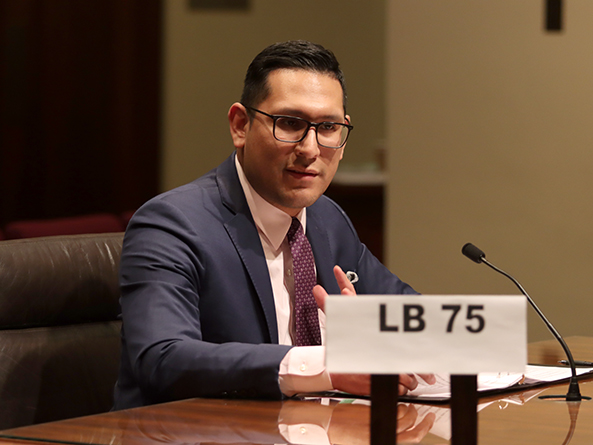Review of maternal near-death data sought
A bill that would allow for the review of instances of severe maternal morbidity was heard by the Health and Human Services Committee Jan. 25.
LB75, introduced by Omaha Sen. Tony Vargas, would grant the state’s Maternal Death Review Team the authority to conduct reviews of the rates, trends and causes of severe maternal morbidity in Nebraska. The bill defines severe maternal morbidity as the unexpected outcomes of labor and delivery resulting in significant short or long-term consequences to a woman’s health.
Vargas said the study of severe maternal morbidity, also referred to as ‘near miss events’ — when a mother almost dies during labor — can improve care for mothers and babies in the future.
“We all want to see better, healthier outcomes for all of our families,” he said.
Severe maternal morbidity can be preventable, Vargas said, but the data necessary to make recommendations to prevent its occurrence often isn’t shared because of privacy concerns. Allowing the state team to review the data could help resolve that issue, he said.
Ann Anderson Berry, medical director for the Nebraska Perinatal Quality Improvement Board, spoke in support of LB75. She said the ability to assess potential causes, frequencies and outcomes of pregnancy complications — such as severe hemorrhaging, hypertensive seizures, stroke and infection — would allow professionals to improve perinatal care in Nebraska.
“It is concerning that we don’t fully understand the rates or causes of severe maternal morbidities in our state,” Berry said. “These are near miss events that put mothers in life-threatening medical situations, require expensive intensive care admission and transfusions and can cause neonatal injury at the time of delivery.”
Also testifying in support of the bill was Chad Abresch. As the leader of a national public health organization, Albresch said he found the one common factor among all high-performing areas of the country is a commitment to collecting and using high-quality data. LB75 would provide the necessary supplemental data Nebraska has been missing by reviewing only instances of maternal death, he said.
“Maternal morbidity is about 100 times more common, which allows us to study these more plentiful events to unearth key strategies we can use to lower both severe maternal morbidity and maternal mortality,” Abresch said. “Data can provide a factual foundation for action.”
I Be Black Girl representative Nyomi Thompson also testified in support, saying LB75 would provide adequate data collection to reveal health disparities and yield solutions to the maternal health crisis experienced by the Black community. In addition to being two to four times more likely to die from childbirth than their white counterparts, she said, Black individuals also are two times more likely to experience severe maternal morbidity when giving birth.
“Equitable, evidence-based intervention can only begin when there is a holistic understanding of the problem,” Thompson said. “Severe maternal morbidity goes further than birth outcomes — it carries into systemic oppressions, racism, inaccessible health care and other social determinants of health.”
No one testified in opposition and the committee took no immediate action on LB75.


